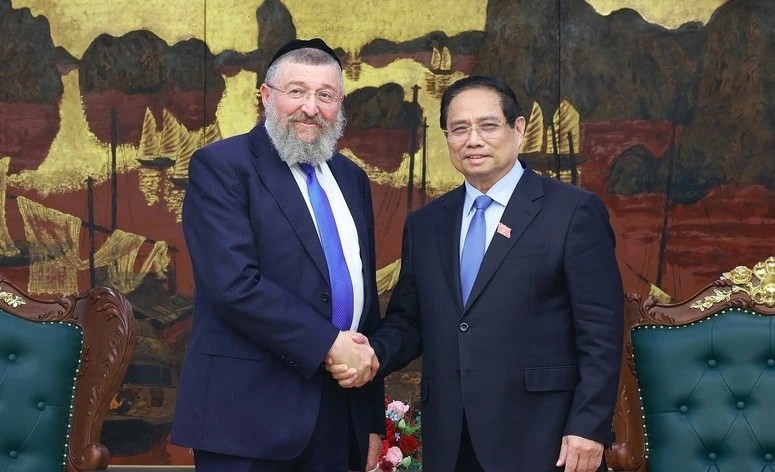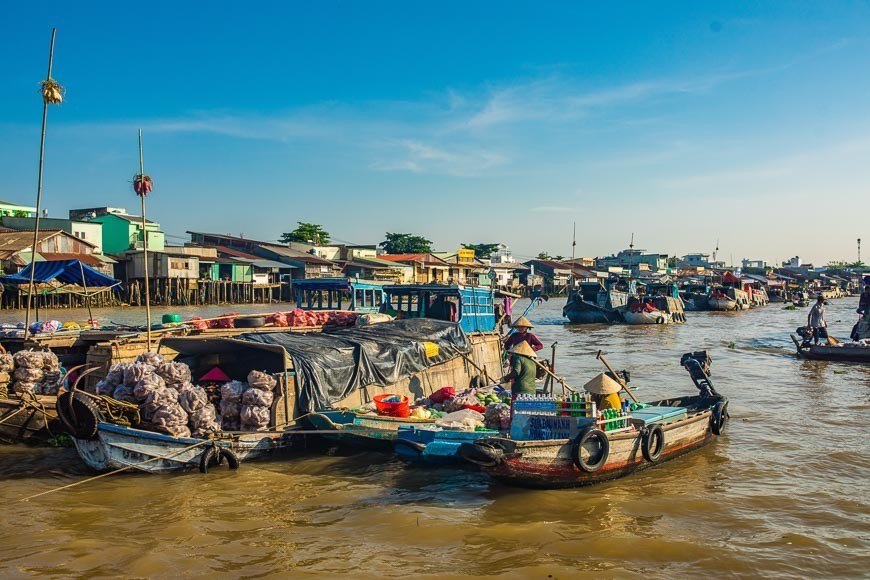Vietnam News Today (Oct. 2): Top Leader’s Visit Gives Extra Leverage to Vietnam – Ireland Trade Links
| Vietnam News Today (Sep. 30): Vietnamese Party, State Leader’s Visit Shows Strong Support For Cuba | |
| Vietnam News Today (Oct. 1): Vietnam, China Seek Stronger Trade, Industrial Cooperation Ties |
| Vietnam News Today (Oct. 2) notable headlines Vietnam eyes enhancing theoretical exchanges with Azerbaijan, Belarus Top leader’s visit gives extra leverage to Vietnam – Ireland trade links Da Nang strengthens cooperation with New Zealand partners IMF forecasts Vietnam's economic growth to reach 6.1% in 2024 Vietnam is Asia’s rising star in global travel trends: Yandex Ads CPV keen to boost collaboration with Mongolia’s political parties Program to promote Vietnamese culinary culture launched Innovation plays an increasingly important role in sustainable development: PM Chinh Ho Chi Minh City marks 34th Day of German Unity |
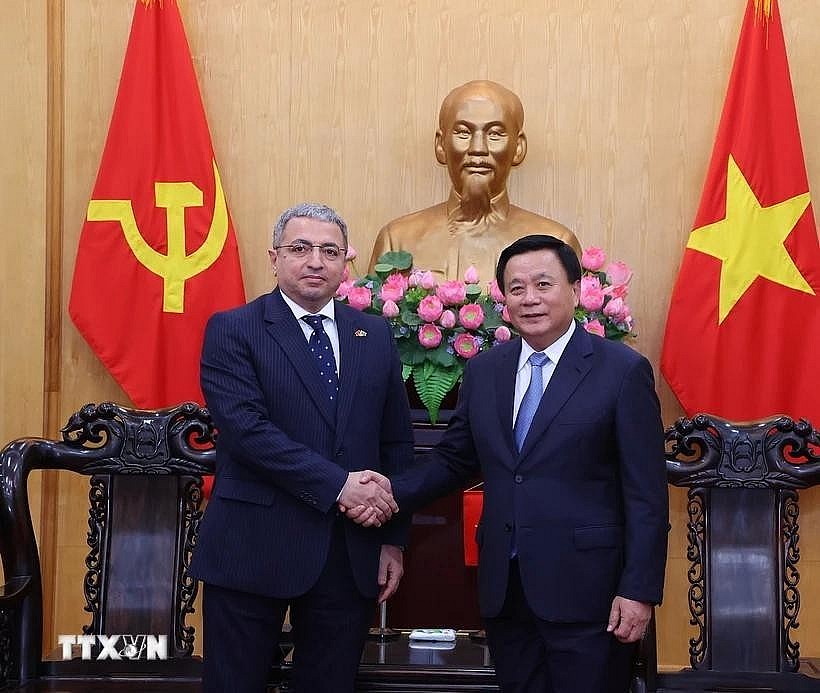 |
| Politburo member and President of the Ho Chi Minh National Academy of Politics Nguyen Xuan Thang (right) and Azerbaijani Ambassador to Vietnam Shovgi Kamal Oglu Mehdizade (Photo: VNA) |
Vietnam eyes enhancing theoretical exchanges with Azerbaijan, Belarus
Politburo member and President of the Ho Chi Minh National Academy of Politics (HCMA) Nguyen Xuan Thang hosted separate receptions in Hanoi for Ambassadors of Azerbaijan and Belarus on October 1.
Receiving Azerbaijani Ambassador Shovgi Kamal Oglu Mehdizade, Thang emphasized that this year marks an important milestone in the relationship between the two countries, as they celebrate the 65th anniversary of President Ho Chi Minh’s historic visit to Baku. He affirmed that Vietnam always attaches importance to consolidating and strengthening its friendship and cooperation with traditional friends, including Azerbaijan.
Expressing gratitude for the sincere and valuable support that the Azerbaijani Government and people have extended to Vietnam during the past struggle for national independence, as well as the current national construction and development, Thang highlighted the importance of deepening the relationship between the ruling parties of both countries, which he said contributes to reinforcing and advancing the traditional bilateral friendship between Vietnam and Azerbaijan.
Thang said he hopes that Mehdizade will connect Azerbaijani educational institutions and the academy to boost cooperation activities, student exchanges and short- and long-term courses. He expressed his wish that his academy and Azerbaijani partners will increase theoretical exchanges to seek common voices in international issues, cited VNA.
The Azerbaijan diplomat said he expects that both sides could develop cooperation in education, along with economic, trade, and scientific-technical bonds. He voiced his hope that Azerbaijani educational institutions, especially the Academy of Public Administration under the President of Azerbaijan and units of the HCMA will explore cooperation opportunities, contributing to deepening the Vietnam-Azerbaijan relationship, meeting the interests of their people.
In his meeting with Belarusian Ambassador to Vietnam Uladzimir Baravikou, the HCMA leader highlighted the traditional friendship between the two countries, which has continuously been strengthened and developed.
Briefing the guest on the academy, he said it currently has cooperative ties with over 200 international partners in global knowledge sharing and training high-quality human resources. He said he wishes to promote cooperation between the academy and Belarusian partners in these two areas.
Thang also suggested the embassy pay attention to connecting the academy with Belarusian partners, including universities, academies, and research institutions, to establish cooperation mechanisms in theoretical research and exchanges regarding global and regional issues of mutual concern.
For his part, the diplomat pledged that his embassy is willing to support and facilitate cooperation programs in theoretical research and exchanges, and personnel training between the two countries, including collaboration between the Belarusian Institute of Strategic Studies and the HCMA.
Top leader’s visit gives extra leverage to Vietnam – Ireland trade links
The forthcoming State visit to Ireland by the General Secretary of the Communist Party of Vietnam Central Committee and State President To Lam and his delegation is expected to provide fresh impetus for bilateral trade links.
Vietnam and Ireland have recorded various achievements in their co-operation and friendship since they first established their diplomatic ties 28 years ago. Trade collaboration has been a key pillar in the bilateral ties on the basis of the effective implementation of the EU – Vietnam Free Trade Agreement (EVFTA).
According to the Ministry of Industry and Trade (MoIT), Ireland represents Vietnam's sixth largest trading partner in the EU, with last year’s two-way trade revenue nearing US$3.5 billion. As of the end of July, Ireland had registered US$60.82 million in 41 projects across Vietnam, duly ranking 55th out of 146 countries and territories investing in the Southeast Asian country. Particularly, after the EVFTA took effect in 2020, Vietnamese exports to the European nation soared by 45.9% on-year to US$502 million in 2022.
According to experts, Ireland boasts sound legal frameworks and incentives for the development of high-tech industry, innovation, and startups, among other factors, making it an attractive destination for global tech giants. The Vietnamese side has maintained a large trade deficit with Ireland for years, with computers, electronic products and components, including semiconductor chips, accounting for 90% of the country’s total import from the market for domestic production and assembly.
Although the two countries have huge cooperation potential, their collaboration in the domains of trade, investment, and science-technology, as well as other sectors of their strengths, remains modest and has not been on a par with their political relations, as well as potential and advantages. They therefore suggested that the two nations intensify the exchange of delegations at all levels and information sharing in a bid to propel bilateral ties forward.
In the framework of a recent visit to Vietnam by a trade delegation of the Irish Government, Martin Heydon, Minister of State at the Irish Department of Agriculture, Food and the Marine, said Irish agricultural products and food have reached out to various markets, meaning that they are keen to provide high-quality goods for Vietnam.
Over recent years, the European state has focused on developing cooperation development programs with the nation, including recent support activities for Vietnam’s agriculture and food sectors, helping Vietnamese goods to access new markets, according to VOV.
Experts said that Ireland will continue promoting its investment in the Vietnamese market, particularly in the areas of the country’s strengths and the nation’s potential, such as green technology, renewable energy, research and development, innovation, agriculture, high technology, and FDI attraction.
Besides, Vietnam will put into place the OECD-led global minimum tax and focus on key collaboration areas at the Vietnam National Innovation Center.
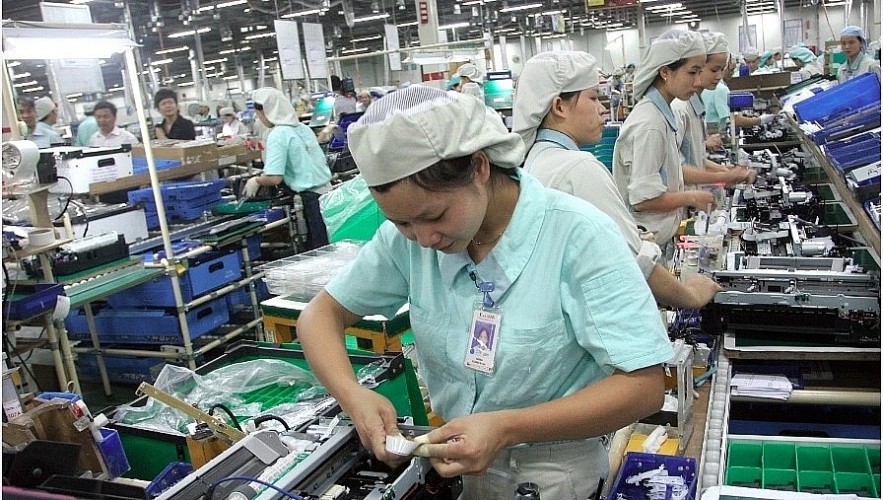 |
| Photo: VOV |
Specialists stated that the two nations should fully capitalize on their existing bilateral and multilateral collaboration frameworks, as well as working together to handle several issues, including Ireland’s approval of the EU-Vietnam Investment Protection Agreement (EVIPA), as well as calling for the EU to remove the European Commission (EC)’s yellow card against Vietnamese seafood products.
A representative of the MoIT said that both sides should step up support for their business communities, helping them seek cooperation, investment, and business opportunities in each other’s market, while also tapping into the opportunities from the EVFTA to the fullest extent amidst the ongoing post-pandemic economic recovery.
Particularly, the Irish side should incentivize its enterprises, composed of global firms headquartered in the nation, to shift and expand investment in the Vietnamese market and support the country to organize trade promotion programs at Irish supermarket chains. This should be done while working to bring Vietnamese goods to Irish distribution chains, thus bridging the trade deficit between the two countries.
The representative also suggested both sides should focus on ramping up co-operation in such areas as manufacturing industry and automation, electronic and digital industries, the application of biotechnology into industry, energy, sustainable consumption, innovation, and high-quality human resources development.
Da Nang strengthens cooperation with New Zealand partners
The central city of Da Nang deems it incredibly important to develop cooperative relationships with New Zealand in various fields, Chairman of municipal People’s Committee Le Trung Chinh said on October 1.
Speaking at a reception for New Zealand Ambassador Caroline Beresford, Chinh expressed his delight at the sound development of the relationship between Vietnam and New Zealand, especially after the two countries upgraded their relationship to a Strategic Partnership in July 2020. He went on to say that the year 2025 is important as the two countries will celebrate the 50th anniversary of diplomatic relations and the 5th anniversary of the Strategic Partnership.
According to Chinh, a Da Nang delegation paid a working visit to New Zealand last month and gained positive results. With the support of the ASEAN-New Zealand Business Council, the city successfully organized a seminar on cooperation and investment promotion in Auckland.
Swiss-Bell Hotel, Neurofrog Technology, Spekia, ANZ Bank, and others expressed interest in collaborating with the city in areas such as technology, education, and hospitality, he said.
New Zealand is a potential market, yet there are not many cooperation programmes with Da Nang, he said, suggesting the New Zealand Embassy coordinate with the Asia New Zealand Foundation to expedite the visit by a delegation of 100 New Zealand businesses to the city in July next year. He also suggested the embassy help promote the city's image, as well as its investment environment, tourism, and education in New Zealand.
For her part, Beresford said the two countries share many similarities and views. In the coming period, they need to identify fields to enhance cooperation, particularly in technology and innovation, where New Zealand is stepping up collaboration with international partners.
The diplomat pledged that she will connect New Zealand businesses and investors with Da Nang, adding that cooperation in other areas should be strengthened to tighten the relationship between the two countries, VNA reported.
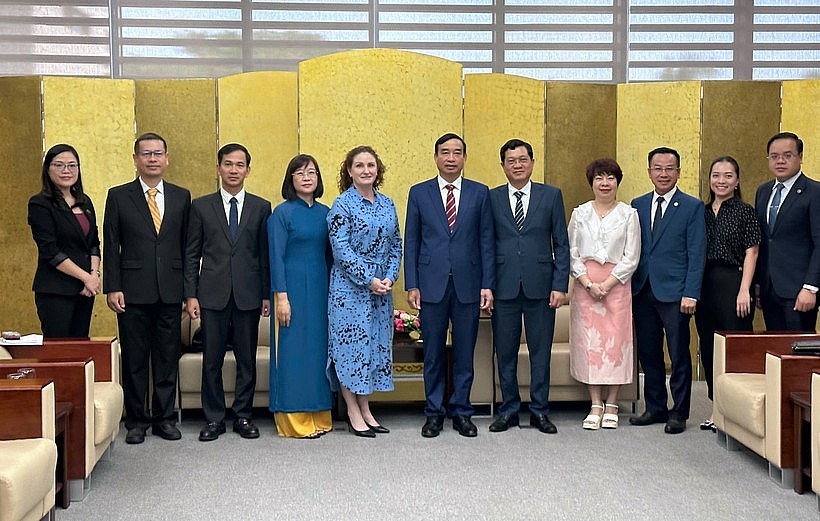 |
| Chairman of Da Nang People’s Committee Le Trung Chinh (sixth, right) and New Zealand Ambassador Caroline Beresford (fifth, left) at the reception on October 1 (Photo: VNA) |
As many as 10 businesses in Da Nang have set up cooperative ties with New Zealand partners. In the first seven months of this year, the city's export to New Zealand was valued at some 3.2 million USD.
New Zealand has been running three projects in Da Nang with a total investment capital of 245,000 USD. Various comprehensive cooperation programmes between Da Nang and localities of New Zealand have been carried out in recent years, especially in education, high-quality human resources training, and health care.
IMF forecasts Vietnam's economic growth to reach 6.1% in 2024
The Executive Board of the International Monetary Fund (IMF) concluded the 2024 Article IV Consultation with Vietnam.
According to their report, economic growth is projected to recover to 6.1% in 2024, supported by continued strong external demand, resilient foreign direct investment and accommodative policies.
Domestic demand growth is expected to recover gradually as corporations navigate through high debt levels while the real estate sector will only fully recover over the medium term.
Inflation is expected to hover around the State Bank of Vietnam (SBV)’s target of 4-4.5% this year.
“Inflation picked up in 2024, driven mainly by rising food prices, though core inflation remained relatively low and stable,” the IMF stated.
“The external current account posted a large surplus in 2023, at 5.8% of GDP, mainly reflecting a significant contraction in imports.”
The IMF's executive directors commended the Vietnamese authorities’ swift actions to maintain macro-financial stability after the economic recovery from the pandemic faced domestic and external headwinds, cited VNA.
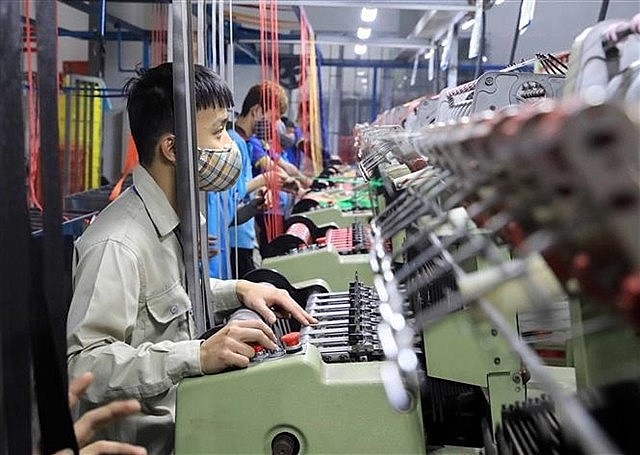 |
| Workers during a working shift at a packaging factory in the northern province of Hung Yen. (Photo: VNA) |
However, it noted that downside risks remain elevated.
Exports, a key driver for Vietnam’s economy, could weaken if global growth disappoints, global geopolitical tensions persist or trade disputes intensify. Given easy monetary conditions, if exchange rate pressures were to persist for longer, it could lead to a larger pass-through to domestic inflation.
“Persistent weakness in the real estate sector and corporate bond market could weigh more than expected on banks’ ability to expand credit, hurting economic growth and undermining financial stability,” the report highlighted.
Given these challenges, further efforts are required to safeguard macro-financial stability and deepen reforms to address vulnerabilities and ensure robust, green and inclusive growth over the medium term.
The IMF's directors noted that fiscal policy should take the lead in supporting economic activity if needed. In this context, they welcomed the authorities’ plans to speed up the implementation of public investment, which will require tackling bottlenecks and stressed the importance of expanding social safety nets to support the most vulnerable. They also recommended strengthening the fiscal framework and budget process and increasing revenue mobilization over the medium term to support the ambitious development agenda.
According to the IMF, the authorities have effectively contained inflation risks. However, they stressed that monetary policy should continue to be cautious under a complex environment and limited policy space.
The IMF's directors also acknowledged the authorities’ swift actions to contain risks in the real estate and corporate bond market but urged more decisive action to tackle remaining vulnerabilities. This includes strengthening the insolvency framework, bolstering institutions and increasing transparency in the corporate bond market.
In addition, Vietnam has also made structural and climate reforms to achieve sustainable, green and inclusive growth. Accelerating the transition to upper-middle income status will require further efforts to improve the business environment, step up critical infrastructure and invest in human capital.
The latest Power Development Plan and the planned Emissions Trading System can help achieve Vietnam’s climate goals and promote energy security, according to the IMF's directors.
Vietnam is Asia’s rising star in global travel trends: Yandex Ads
Vietnam has become a prominent player in global travel trends, attracting significant interest from international travelers.
Vietnam, with its stunning landscapes, rich culture, and affordable prices, has become a prominent player in global travel trends, attracting significant interest from international travelers, especially those from Russia and the Commonwealth of Independent States (CIS), as detailed in a recent report by Yandex Ads.
The report highlighted a surge in user interest in traveling to Asia, including Vietnam, during the second quarter.
China, Thailand, and Vietnam were the top three most searched countries in Russia. Similar trends were observed in other CIS regions, with a notable increase in search queries for the three destinations.
Vietnam notably emerged as the most popular Asian travel destination, with a 57 percent and 48 per cent rise in search queries from Russia and other countries, respectively. This heightened interest indicates a growing desire to explore the diverse offerings of the country, VNS reported.
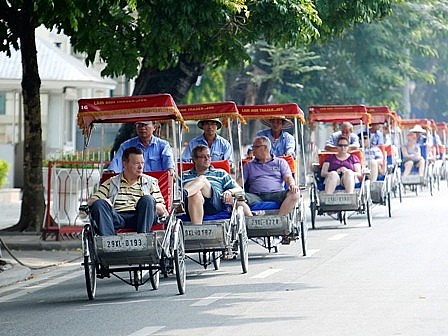 |
| Russian tourists visit HCM City. Many tourists from Russia and the Commonwealth of Independent States (CIS) want to travel to Vietnam in the coming time. Photo: vietnamtourism.gov.vn |
Key destinations such as Nha Trang, Phu Quoc, Hanoi, HCM City, Da Lat and Da Nang experienced a substantial increase in search queries, with Nha Trang witnessing a remarkable 130 per cent surge.
These cities stand out for their natural beauty, favorable tropical weather, and plethora of unique experiences, positioning them ahead of other Asian destinations, the company said.
“The future of Russian tourism presents significant opportunities for Vietnam's development. Vietnamese businesses can tap into the growing market of Russian travelers to ensure businesses target the right demographics and maximize their reach,” said Thu Nguyen, business development manager of Yandex Ads in Vietnam.
Potential of Russian-speaking tourists
The report sheds light on the travel preferences of 15 million Russian and CIS tourists, highlighting their inclination towards social, family-oriented trips that often involve partners, children, or friends.
Wealthier tourists from this demographic tend to spend upwards of US$2,300 per person on their international travels.
Most Russian and CIS tourists embark on trips lasting one to two weeks or longer, providing ample time to explore various activities across different destinations.
Coastal destinations are particularly favored by Russian-speaking travelers, who enjoy tropical climates and water-based activities.
Russian-speaking tourists often seek multi-faceted holiday experiences, combining relaxation on the beach with sightseeing and active pursuits.
They show a preference for alternative accommodations like apartments, villas, and glamping, reflecting their interest in experiential travel over traditional hotel stays.
Data indicates that women aged 25-44 with average to high incomes are the primary demographic making travel queries about Vietnam, highlighting their spending capacity and demand for diverse, high-quality itineraries.
Yandex Ads suggests that Vietnamese travel agencies, hotels, and tour operators can leverage these insights to align their offerings with the latest search behavior trends for enhanced engagement with this growing market.
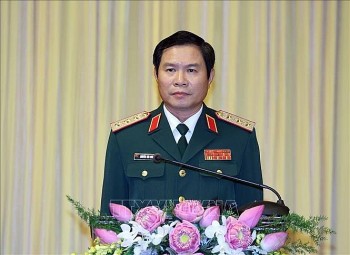 | Vietnam News Today (Sep. 28): Vietnam, RoK Intensify Defense Cooperation Vietnam News Today (Sep. 28): Vietnam, RoK intensify defense cooperation; Australia and Vietnam foster innovation, education, training partnership toward green economy; HCM City fosters cooperation ... |
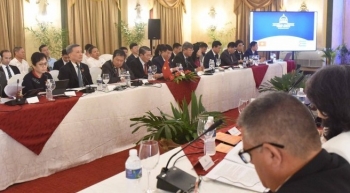 | Vietnam News Today (Sep. 29): Vietnam, Cuba Beef up Parliamentary Cooperation Vietnam News Today (Sep. 29): Vietnam, Cuba beef up parliamentary cooperation; UN Human Rights Council adopts Vietnam’s UPR cycle IV report; Vietnam hopes for further ... |
Recommended
 National
National
Shangri-La Dialogue 22: Vietnam Highlights Some Issues of Ensuring Stability in a Competitive World
 National
National
Vietnam News Today (Jun. 1): Vietnamese, Japanese Firms Foster Partnership
 National
National
Vietnam News Today (May 31): Vietnam Strongly Supports Laos’s National Development
 National
National
Vietnam News Today (May 30): Vietnam, Venezuela Reinforce Ties Through People-to-people Diplomacy
 National
National
Vietnam News Today (Jun. 3): PM Pham Minh Chinh to Attend UN Ocean Conference, Visit Estonia, Sweden
 National
National
Vietnam News Today (Jun. 2): Vietnamese Trade Mission Sounds Out Business Opportunities in United States
 National
National
Vietnam News Today (May 29): Vietnam and Hungary to Expand Cooperation into New Areas
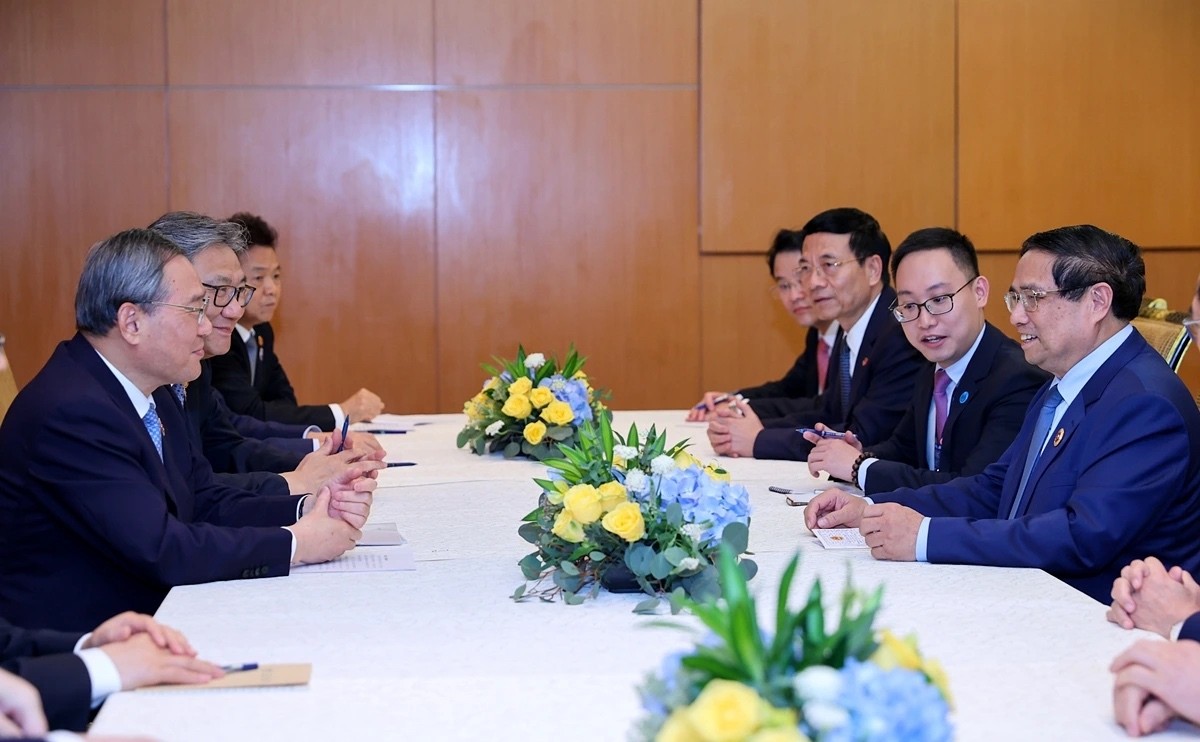 National
National

